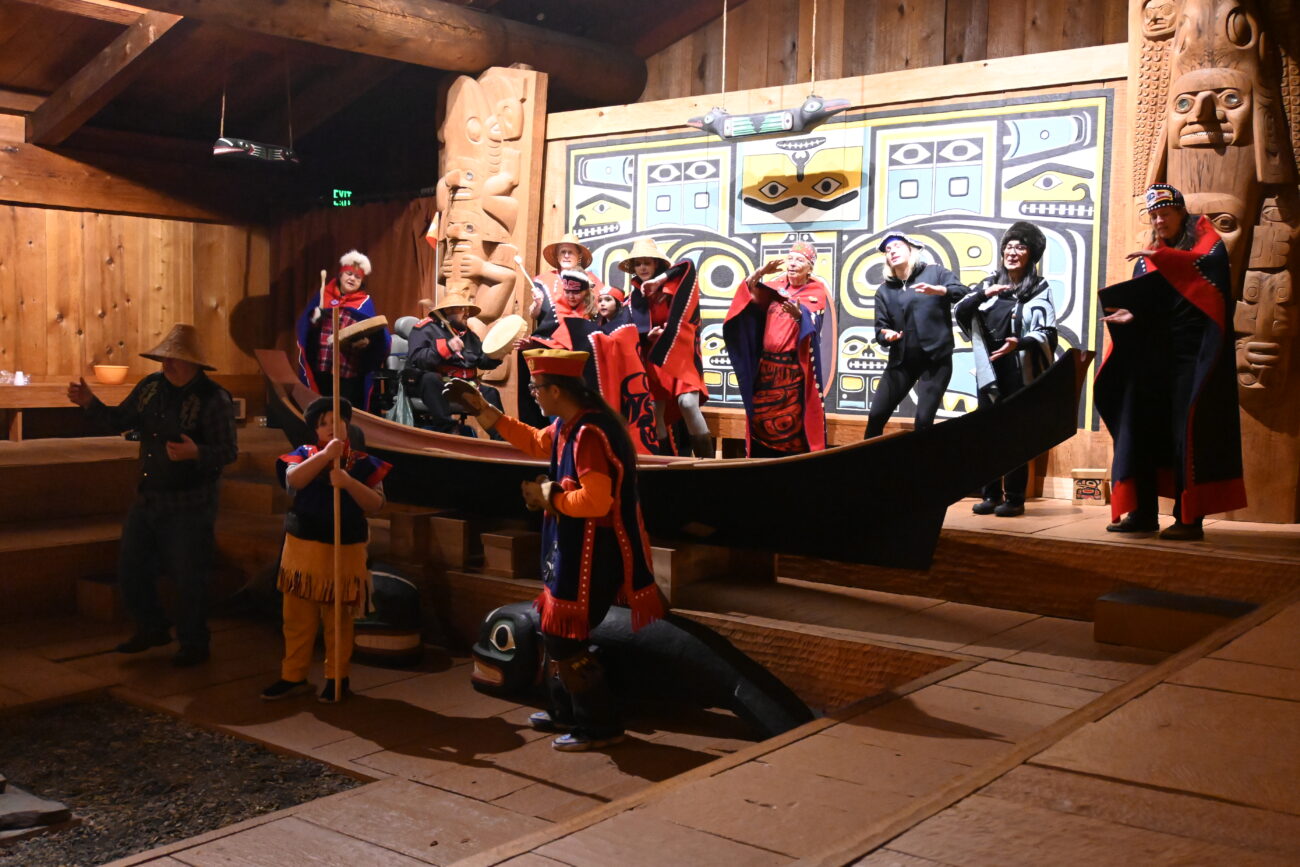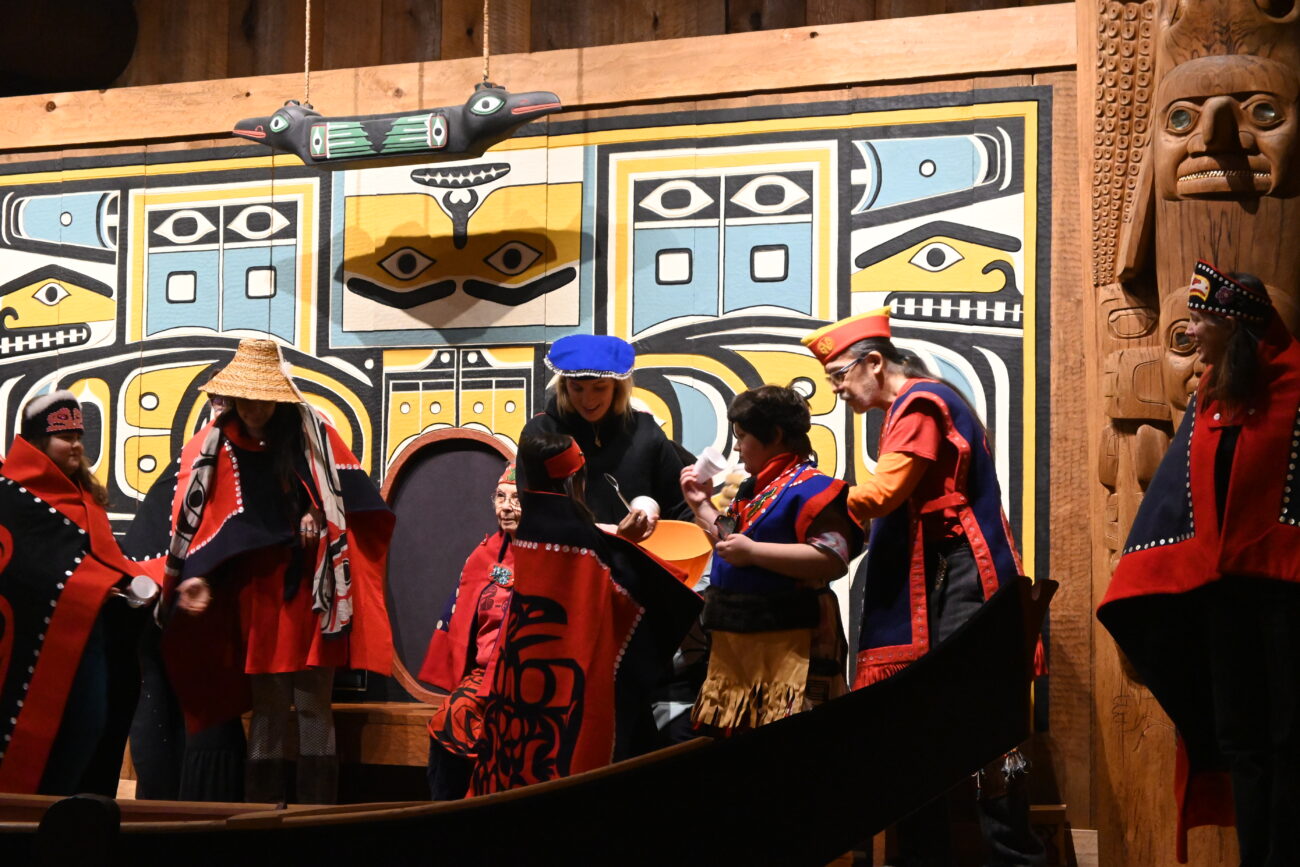
The Native Civil Rights leader, Elizabeth Peratrovich, who was Tlingit, helped bring an end to discrimination in Alaska in 1945. Days after she made an important speech at the Alaska Territorial Legislature’s House and Senate debates, the state designated February 16th as Elizabeth Peratrovich Day.
To celebrate the day this year, Wrangell’s traditional dancers and elders recorded dances for a statewide conference that was held on Elizabeth Peratrovich Day.
Over a dozen dancers and elders congregated inside Chief Shakes Tribal House to practice for the Elizabeth Peratrovich Day celebration. They are the Wrangell Johnson-O’Malley Kaats’litaan Dancers and Elders. Some also belong to the Alaska Native Brotherhood and the Alaska Native Sisterhood.
“I’ll introduce myself in Tlingit. Ts’ootsxan Tlaa. Yóo x̱at duwasáakw. Ch’áak’ naax̱ x̱at sitee. Shtax’héen Ḵwáan áyá x̱át,” Sandy Churchill said. “I was born and raised in Wrangell. I belong to the Eagle Clan and I am chairing the Elizabeth Peratrovich virtual event.”
The celebration was at The Nolan Center on February 16.
“It’s been a while since we’ve really had a good celebration for Elizabeth Peratrovich,” Churchill said. “She deserves it.”
A yellow cedar canoe sits in front of the decorated cedar curtain behind the fire pit at Chief Shakes House. When practice began, the group went over the dances. Xwaanlein Virginia Oliver, who helped lead the dances, introduced the set.
“People ask us why we dance,” Oliver said. “Raven told us why we dance. We dance in appreciation.”
They talked about the songs for the recording. One was about working together – the soapberry song. Oliver instructed the dancers on what to do.

“Go like this with your spoon in your cup: tap tap tap tap tap tap tap tap tap,” she said. “You’re waiting for Mia’s soapberries to rise.”
Oliver acknowledged the guests who were expected to be at the ceremony virtually.
They include U.S. Senator Lisa Murkowski, state Representative Dan Ortiz, ANB and ANS Grand Camp Officers, Sealaska Heritage Institute, Southeast Landless Representatives, Lance Twitchell, a professor of Native languages, arts, and sciences, and the Peratrovich family.
“Aanshawasnúk. Yéi x̱at sitee. Naanya.aayí áyá x̱át. Kiks.ádi yádi áyá x̱át. Ḵaachx̱an.áak’wx’ ḵux̱wdzitee.” Luella Knapp, who spoke to the camera, said. “My Tlingit name is Aanshawasnúk. I am from the Eagle Ch’áak’.”
After the dance, Oliver said they might do a little love song for Elizabeth Peratrovich, who was Raven moiety. After much debate on what to do, they settle on the Box song. It represents opening a box for Peratrovich.
“Make the box big,” Oliver said. “Maybe show the little girls how to do it. Boys don’t do it but girls do.”
Emma Frost, an elder, returned to Wrangell two years ago from Oregon, when her husband passed away. She dances with the group and said the closeness of the Tribe is what makes her feel like she belongs. She thinks of her ancestors when she dances.
“When I dance, I think I’m dancing for my mom or dad, my brother and my grandmothers,” she said.
Another dancer, Arthur Larsen, explained that during some of their dances the guys go down by the fire pit and the girls and women stay above.
“My Tlingit name is called Kaakẃ Yéis`,” Larsen said. “It means Young Eagle. The way I’m a descendant to Auntie Elizabeth is my grandma Sarah.”
His grandmother, Sarah, was a Peratrovich. She got married to Larsen’s grandfather and they moved to Wrangell. Larsen said he found out later in life that Elizabeth Peratrovich was his aunt.
“I didn’t know that she was my auntie until I got older,” Larsen said. “It was about 2013 when I started singing and dancing. I never knew any songs or anything. I didn’t even know how to dance.”
He said that before they went to the regional Southeast gathering Celebration in 2013, Virginia Oliver said she had something that belonged to Larsen’s family. It was his grandmother’s tunic that Oliver found at a garage sale for $20 that the homeowner found in the wall of his grandma’s old house in Wrangell.
“When we got the tunic back, me and my mom were at my house and Virginia brought it up,” Larsen said. “Well we all got a group hug and we started blubbering and tears were coming out and they were happy tears, but anyway my mom handed it to me and said, ‘You take care of this.’ So now, the thought of my grandma dancing with it. And now that I found out that Elizabeth Peratrovich, my auntie, I’m a pretty proud Indian.”
Larson said that there’s a lot to his Tlingit culture. He didn’t know how much when he first started but he remembers hearing drums and songs when he was on the boat as a little kid. He said he wishes he got to meet his aunt Elizabeth…and his great-grandfather Chief Shakes VII.











